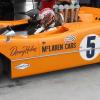I've always wondered how it is f1 drivers practise, and how they improve their driving technique. imo F1 drivers are among the most talented athletes in the World, and their wages reflect the talent they possess (In 2010 Schuey earned more than Messi, and Alonso more than Nadal!). But unlike other sportmen I have absolutely no idea what the average day of an f1 driver consists of in terms of actual driving. All other sportmen spend hours every day in training whether it be boxing, golf or premier league footballers spending the morning practising with their manager & team mates (and In Ashley Coles case shooting passers by!) long after they have won their first titles and reached the top of their games.
A lot of recent sports pychology books (eg Bounce) seems to show that than the time spent practising your chosen sport can be more important than your 'natural born talent' [with some studies claiming no such even thing exists!]. I've read statements from previous managers of how Thierry Henry and Cristiano Ronaldo were from an extremely young age ALWAYS the first ones in and last one out their training sessions. Andre Agassi has also has talked about how his rather militant dad made him hit a million balls per year as a kid, where any deficits in natural talent were made up for by repetition and anticipation [two crucial skills for a driver]. I think Nicklaus said something like ' the more I practise the luckier I seem to become'. Its hard to find a top star in any chosen sport that hasn't been working extremely hard to get there.
What I find quite surprising is that In a sport where millions are spent to ensure every mm of a car is scrutinised and every excess gram of weight is removed the work these guys do behind the scenes seems, at best primitive and at worst very distracting! With sponsor events every other week, it's not surprising when people like Lewis say they are don't have enough time to mentally prepare for races. I'm not naive and of course Mclaren need their drivers out in the public eye but I mean can you imagine Alex Ferguson letting Rooney and Ferdinand go off to have a kickabout in Moscow a week before the champions league final?
Of course we hear a lot about the the gym work these guys do, but fitness is one thing, for anyone whos had driver coaching they would agree even small improvements to driving technique can reap huge dividends on the track. I read recently that Chandhok said he has a go kart track in his back yard and he goes out a few times a week to stay sharp which seems like quite a good idea. Simulators are probably the most used tool, sure drivers use them for testing performance upgrades but how many laps do they do against themselves trying to knock off that last thousandth off their "high score" before qualifying starts? How do they practise racecraft? Lewis said on the BBC last yr that quite a large number of the grid play f1 2010 online. Recreation aside I guess its an easy way to get some racecraft in, but no amount of call of dutys going to get me ready to go to war. On a bit of a side note I guess its an insight into how rare real hands on driving has become, particularly since the testing ban was introduced. I really feel for the rookies, Hulkenburg seemed to be improving @ every race last year. It's a bit of a joke that these guy's are thrust into driving at 190mph speeds around circuits they've never been on before. Due to the incredible pressure to be competitive inexperienced mistakes like Perez's at Monaco are surely a sign of things to come.
On a final note (I promise!) a big part of training is getting a coach to iron out any bad habits you've picked up, quite shockingly I can't think of any drivers that employ a driving coach (at least publicly). Every single other sport has an equivalent, even Federer, with an ego large enough to rival his talent has hired a coach now that he's no longer dominating mens tennis. He'll never lose talent, but I guess the coach can help in the mental side of the game which is arguably the most important side when the stakes are so high. Hamilton used to have his dad coaching him in the old karting days, always daring him to brake later and later, challenging him despite never having raced himself. I know Lewis has moved on since then but by no means is he, or any other driver on the grid perfect. When he was at mcclaren Coulthard brought a coach round to Qualifying with him to give him pointers as to where he was losing time, but I mean I can't remember many other cases. I've also wondered why Rubinho doesn't hire a coach (or even me) to teach him to left foot brake which is surely quicker than what he does atm xD As Mike Tyson used to say you win or lose a fight long before you enter the ring, it makes me wonder if practise in f1 is as methodical and important as it is in other sports?


























